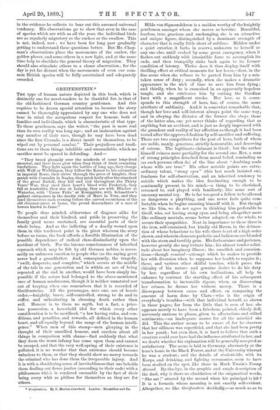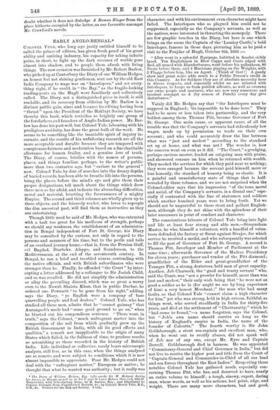GRELNENSTEIN.* THE type of human nature depicted in this book,
which is distinctly one for novel-readers to be thankful for, is that of the old-fashioned German country gentleman. And this requires to be drawn special attention to, because the story cannot be thoroughly appreciated by any one who does not bear in mind the scrupulous respect for honour, both of families and individuals, which is characteristic of that type. To these gentlemen, says the writer, "the past is more real than its own reality was long ago ; and an insinuation against any member of their race, though he may have been dead since the first Crusade, is a direct insult to themselves, to be wiped out by personal combat." Their prejudices and tradi- tions are to them things infallible and unassailable, which no sacrifice must be spared in defending. And— "They brood gloomily over the misdeeds of some long-dead ancestor, and their faces glow when they think of their crusading forefathers. They fight again the battles of long ago, they charge with Welf or Weiblingen, they follow the Kaiser to his coronation in imperial Rome, they strive through the press of knights, they perish with Conradin in Naples, they prick hotly after the standard of the great Rudolf, they kill and riot throughout the Thirty Years' War, they shed their heart's blood with Frederick, they fall at Austerlitz, they rise at Leipzig, they are with Blficher at Waterloo, with Unser Fritz' at Koniggratz, with Schmettow's gallant cuirassiers in the deadly ride of Mars la Tour, and they land themselves each evening before the carved escutcheon of the old chimney-piece at home, the proud descendants of a race of heroes known to fame."
To people thus minded, abhorrence of disgrace alike for themselves and their kindred, and pride in preserving the family good name unstained, are essential parts of their whole being. And as the inflicting of a deadly wound upon them in this tenderest point is the pivot whereon the story before us turns, the book affords a forcible illustration of the possible dependence of radical class-dissimilarity upon the accident of birth. For the intense consciousness of inherited reproach which may be felt by old German nobles, is neces- sarily an unknown emotion to people who (as the saying goes) never had a grandfather. And, consequently, the tragedy, "swift, desperate, and complete," which occurs at the middle of the tale in one generation and is within an ace of being repeated at the end in another, would have been simply im- possible if the actors had belonged to the above-mentioned race of human mushrooms, though it is neither unnatural nor out of keeping when one remembers that it is recorded of Greifensteins. All the personages, save one, are of heroic order,—knightly, brave, self-controlled, strong to do and to suffer, and unhesitating in choosing death rather than evil. Honour is to them no myth, but a fact, a price- less possession, a household idol for which every other consideration is to be sacrificed, "a law having rules, and con- ditions, and penalties, and rewards, all defined in the human heart, and all equally beyond the range of the human intelli- gence." When men of this stamp—men glorying in the thought of their unsullied honour, and careless about all things in comparison with shame—find suddenly that what they deem the worst infamy has come upon them and cannot be escaped, and that the very well-spring of their existence is polluted, it is no wonder that that existence should become valueless to them, or that they should show no mercy towards the criminal who has done them the irreparable injury. And it is with a shuddering sense of inevitableness that one beholds them dealing out fierce justice (according to their code) with a pitilessness which is rendered excusable by the fact of their being every whit as pitiless for themselves as they are for others.
arcifenstein. By F. Marion Crawford. London : Macmillan and CO. Hilda von Sigmundskron is a maiden worthy of the knightly gentlemen amongst whom she moves as heroine. Beautiful, fearless, true, gracious, and unchanging, she is an attractive and unique figure, distinguished by a dominant strength of character that is really little short of sublime. Hidden under a quiet exterior, it lurks in reserve, unknown to herself or any one else, until evoked by some great emergency, when it flashes out faiddenly with irresistible force to accomplish its ends, and then tranquilly sinks back again to its former condition of latency. Thrice does it thus display itself with thrilling effect at critical moments for her lover,—first, in the fine scene when she refuses to be parted from him by a mis- taken sense of duty ; secondly, when she makes a dramatic appearance in the nick of time to save him from dying ; and thirdly, when he is enmeshed in an apparently hopeless tangle, and she extricates him by cutting the Gordian knot with a magnificent stroke. Her love, as it corre- sponds to this strength of hers, has, of course, the same attribute of sublimity. And it is somewhat remarkable that, though her love and self-interest always point the same way, and in obeying the dictates of the former she obeys those of the latter also, one yet never thinks of regarding that as anything but an accident, and is just as deeply impressed with the grandeur and reality of her affection as though it had been tested after the approved fashion by self-sacrifice and suffering. There are two competitors for the post of hero, both of whom are noble, manly, generous, strictly honourable, and deserving of esteem. The legitimate claimant is Greif ; but the author himself evinces more partiality for the second one, Rex, a man of strong principles detached from moral belief, reminding us (as such persons often do) of the line about "doubting souls whose wills are true." His other notable points are extra- ordinary talent, "stony eyes" (this last much insisted on), fondness for self-observation, and an inherited tendency to suicide which makes the idea fascinating enough to be continually present in his mind,—a thing to be cherished, returned to, and played with familiarly, like some sort of uncanny mental toy. He is far too good a fellow to be allowed so dangerous a plaything, and one never feels quite com- fortable when he begins amusing himself with it. But though we like him, we do not agree in thinking him preferable to Greif, who, not having stony eyes, and being altogether more like ordinary mortals, seems better adapted, on the whole, to secure their sympathies. Next in importance to these three is the iron, self-contained, but kindly old Baron, in the delinea- tion of whose behaviour to his wife there is art of a high order shown, and wherein elements pathetic and ludicrous are blended with the stern and terribly grim. His forbearance and patience, however greatly she may irritate him ; his almost tender solici- tude about her imaginary illness ; the unselfish and conscien- tious—though comical—attempt which he makes to provide her with diversion when he supposes her health to require it ; these, and various other skilful touches, which prove the chivalry of his nature and genuine desire to do his duty by her, regardless of his own inclinations, all help to enhance by contrast the startling effect of his subsequent transformation to inexorable rigour, when, on discovering her crimes, he dooms her without mercy. There is a. discrepancy between cause and effect, on comparing the amount of harm done by Clara—who is the origin of everybody's troubles—with that individual herself, as shown in these pages; for from the little that is seen of her, she appears merely to have been a frivolous, painted, elderly doll, nervously anxious to please, given to affectations and stilted sentiments,—an inadequate source for all the mischief she did. This the author seems to be aware of, for he observes that her silliness was superficial, and that she had been pretty in her youth ; but even then, it is hard to believe that such a creature could ever have had the influence attributed to her, and we doubt whether his explanation will be generally accepted as satisfactory. The scene is laid in Germany, alternately at the hero's home in the Black Forest, and at the University whereat he was a student ; and the details of student-life, with its Korps, and drinking, and fighting ceremonies, seem to have been studied on the spot, like those in Mark Twain's Tramp Abroad. By-the-bye, in the graphic and ample description of the duel, why is there no elucidation of the enigmatical words, "She sat !" uttered by the second when his principal is hit P It is a formula whose meaning is not exactly self-evident. Altogether, we like Greifenstein decidedly,—so much so as to doubt whether it does not dislodge A Boman Singer from the place hitherto occupied by the latter, as our favourite amongst Mr. Crawford's novels.



































 Previous page
Previous page